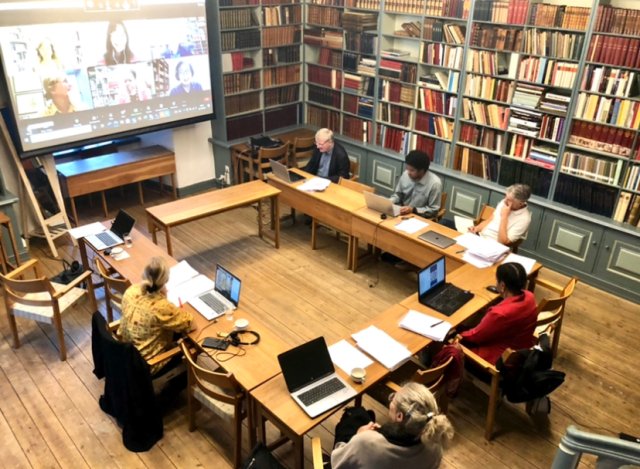Utstein Workshop on Transloyalties, Connected Histories and World Christianity in the Twentieth Century

- Av: Marina Xiaojing Wang
- Publisert: 11. januar 2022.
‘Connected Histories – Contested Values. World Lutheranism and Decolonization: Processes of Transloyalties, 1919-1970’ (CHCV) is one of the three appointed Excellence in Research projects at VID Specialized University in 2020-2023. The aim of the project is to analyse negotiation processes between various Lutheran churches and other stakeholders in education and health care with a focus on loyalties, competing loyalties and transloyalties.
The project team is now preparing for their first book publication titled Transloyalties, Connected Histories and World Christianity in the Twentieth Century to be included in Routledge’s series Studies in World Christianity and Interreligious Relations. Project leader Prof. Frieder Ludwig, together with other members in the core group, including Prof. Ellen Vea Rosnes, Dr. Joar Haga and the two post-doctoral research fellows who joined the team since September 2020, Dr. Jairzinho Lopes Pereira and Dr. Marina Xiaojing Wang, invited scholars from China, Taiwan, Madagascar, South Africa, Denmark, Germany, Norway and North America to gather together and present their contributions to the forthcoming volume at a three-day workshop from 19th to 21st October 2021. Due to the unstable condition of COVID-19 and international travel restrictions, the workshop took place with a combination of physical and virtual forms. Its offline venue was Utstein Kloster, where most of the members of the Stavanger team and the core group and three VID researchers and archive and library staff physically participated.
The three-day intensive and inspiring discussions and mutual exchanges enabled the contributors to understand and engaged in the key concepts of ‘transloyalties’ and ‘connected histories’ more precisely and comprehensively and to revise their chapters accordingly to make the overall volume as balanced and coherent as possible by the end of March 2022. Then the project team will finalise the manuscript to be ready for submission by the end of August 2022.
Transloyalties, Connected Histories and World Christianity in the Twentieth Century
As the first outcome of this Excellence in Research project, the volume introduces the new concept of ‘transloyalties’ as an analytical tool to study ‘connected histories’ in World Christianity from 1920 to 1970, examining the multifaceted processes in various contact zones, through which cultural and religious identities were transformed in the negotiation and tension between different loyalties.
The book is structured with a combination of general theoretical reflections and specific case studies contributed by internationally established scholars. The new theoretical concept of ‘transloyalties’ is introduced and clarified at the beginning of the volume, followed by case studies discussing how confessional identities were shaped in the processes of internationalisation, the concept of transloyalties in the key areas of education and health care, and the tendencies of redefining religious and political boundaries during the negotiation processes. Differed from most of the existing scholarship in twentieth-century World Christianity that often follow a continental or thematical pattern, this volume underlines intercultural and cross-border interactions, negotiation processes and changes in the relationships between various actors and agencies, especially Christian actors and church- and mission-related agencies.
Drawing reference from case studies across various regions in Asia, Africa, Europe and North America, the book attempts to provide fresh insights into a number of questions emerged in the interactions and negotiation processes in the history of World Christianity between 1920 and 1970. How did churches and Christians in different contexts (re-)construct their values in the changing circumstances? How did they negotiate with colonial governments, national and ecclesial movements and international organisations? How did their loyalties interplay or compete with each other, or shift from one to another when the actors’ multiple identities and communal relations were intertwined?